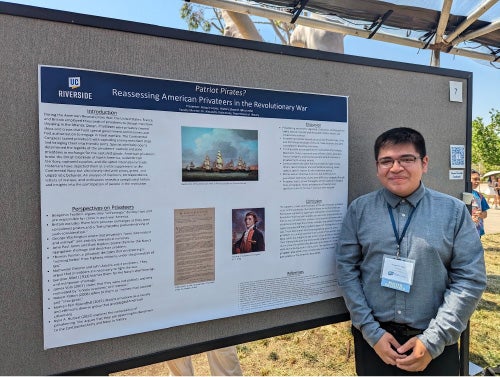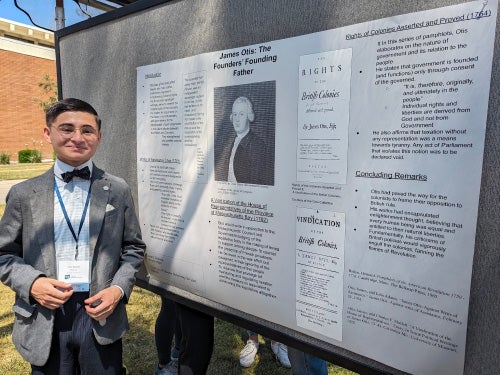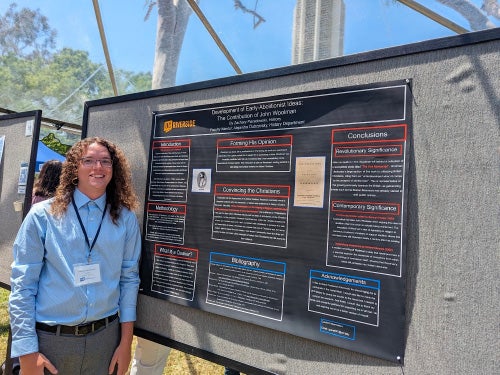
What do pirates, revolutionaries, deafness, museums, and gambling have in common? These were just some of the research topics History students presented at the 2023 Undergraduate Research, Scholarship, and Creative Activity Symposium. The symposium provides an opportunity for undergraduate students from all disciplines to share their research and creative activities with the UCR community. Over one hundred undergraduate students presented their emerging and completed scholarship over zoom, and 109 braved the hot afternoon sun on April 28th to present posters on the research.
Chelsea Younglove, working with Professors Antoine Lentacker and Georg Michels, explored the nexus of revolutionary ideas, images, and rituals in the French Revolution, with her paper “Republican Virtue and the Festival of the Supreme Being.” Her research draws on original manuscripts from the French National Library. Embarking on a comparative approach with examples from Ancient Rome and the US, Leon Du presented his thought-provoking paper, “Do Open Political Institutions Contribute to the Success of a Nation;” he worked with Professor Denver Graninger. Under the guidance of Professor Jennifer Hughes, Madelyn Houser interrogated the long and colonial legacies of disabilities in her innovative scholarship: “Deafness, Catholicism, and Colonialism in Mexico.” Keani Lei Lee, with the support of Professor Cathy Gudis, presented a fascinating paper that questioned how institutions could design and conduct heritage preservation. Her work, “Exploring the Public History Field: An Internship at the Smithsonian Center for Folklife and Cultural Heritage,” builds on an internship with the SMITHSONIAN CENTER FOR FOLKLIFE AND CULTURAL HERITAGE. Finally, Zoe Hirabayashi, working with Professor Dubcovsky, shared her Mellon Mays Fellowship research on Japanese wartime incarceration and resistance with her paper, “How Do We Define Resistance? A Study in Wartime Drafts, Basketball Leagues, and Gambling.”
Three history students decided to brave the sea of CNAS and Engineering posters and present their research in person. Zachary Paradowski and Jose Zepeda made posters highlighting the intellectual histories of the American Revolution. Paradowski focused on the Abolitionist thought and impact of John Woolman while Zepeda explored the impact of James Otis on the American Revolution. Joaquin Lopez also examined this time period, but focused instead on the role of pirates and privateers in the conflict. The posters of these three students told new stories of the history of the early United States.



Whether they presented their research virtually or in person, these undergraduate historians are a testament to the power and possibilities of historical research. They collected and interrogated primary sources. They organized their findings in creative ways. They asked innovative questions and challenged old assumptions. They narrated new stories. The scholarship of these students showcases a future generation of promising young historians.